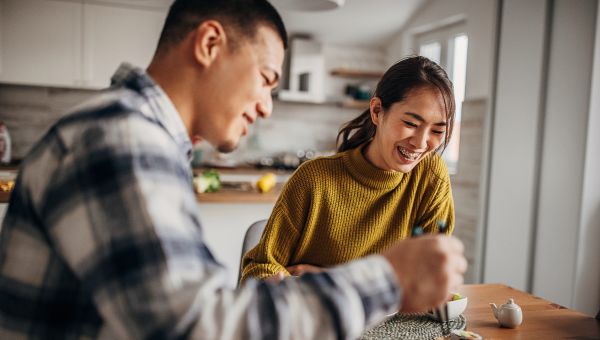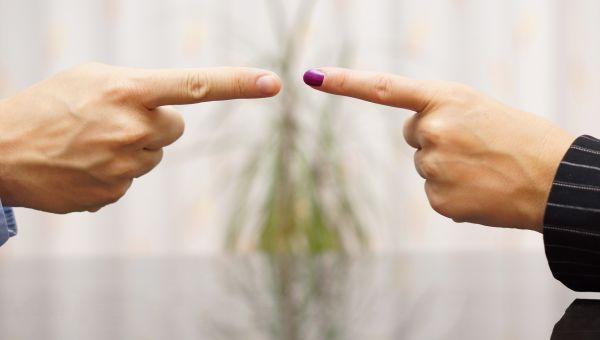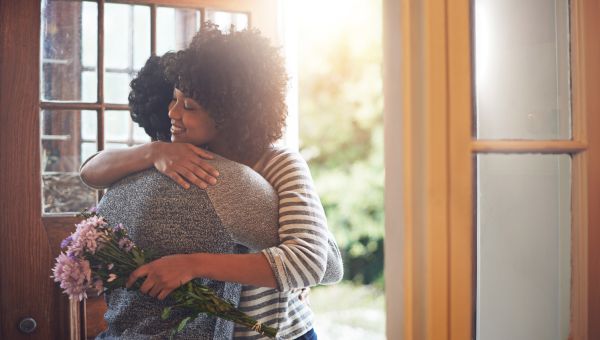Therapist-approved tips for a long-lasting relationship
Most couples experience some ups and downs. Smooth the bumps with this expert advice.
Updated on December 14, 2022

Did you know that being in a committed relationship may actually improve your health?
A 2019 study in PLoS One found that compared to married men, never-married men were at an increased risk for developing hypertension. Mortality rates also increased in the never-married population. And in a 2016 study from Social Science & Medicine, researchers found that never-married, divorced, or widowed adults were more likely to die after a heart attack compared to those who were continuously married.
Committed relationships can also positively affect mental health. A 2022 study published in Frontiers in Psychology found that, during the COVID-19 pandemic, people in happy relationships experienced better mental health than single people or people in less satisfying or lower-commitment relationships.
So, what’s the secret to a strong relationship? And are you and your partner’s habits in line with what’s healthy? Marriage and family therapist Bruce Conn of Coliseum Medical Center in Macon, Georgia, shares some of the things happy couples do and some of the things they don’t.

Don’t: just ask “how was your day?”
While you should check in with your partner at the end of a long day, try to avoid generic questions like “How was your day?” and “Did you have a good day?” It’s likely that those questions will be answered the same way day after day. Standard answers are usually “It was good,” “So busy and stressful,” or “It was fine.” Asking those questions doesn’t mean you don’t care about your significant other—but there are better ways to ask.
Here are some questions that will help you gain insight into how your better half’s day actually went:
- “What was the best part of your day?”
- “What was a success you had today?”
- “What energized you today?”
- “What was something hard that happened today?”
- “What did you struggle with today?”
- “What drained you today?”

Don’t: point blame
A relationship is about negotiation, compromise, and understanding, says Conn. “I often say, if you're right, you're wrong.” So, if you’re pointing blame at your partner for the issues you’re experiencing, you may want to look for their best traits and think about what you can do to make the situation better.
If your partner does something that annoys or frustrates you, remember that they aren’t doing it out of spite. They may not even realize they’re doing it, so blaming them for the imperfection may make them feel defensive. Calmly communicate about the issues, rather than immediately assuming they’re doing it on purpose.
Remember that you should hold yourself to the same standards to which you hold your partner. If you’re asking them to clean up after themselves, make sure you’re doing the same.
Keep your relationship positive—no matter what small disagreements you’re having—by making a note each week of everything your partner does right. (Maybe they straightened their side of the closet or cooked an amazing dinner). You may find that you’re both encouraged and proud of each other.

Try not to: go to bed mad
Going to bed mad is not ideal, but Conn says it’s going to happen sometimes. Think about it—you and your partner are in the middle of a disagreement, but it’s almost 2 a.m. Neither of you have the best mindset—or the energy—to discuss important issues. “Sometimes you just need to go to bed, because you've got to get up and go to work the next day,” says Conn. If you’re both exhausted, it’s better to table the talk and go back to it after you’ve slept on it.
It’s not healthy to completely press pause on important issues that come up, but it’s OK to wait to discuss the problem when you’re both calm. When you do end up talking about the issue, both parties should be allowed to discuss their feelings on the topic.

Do: have fun and laugh as much as you can
A sense of humor can take you far in life, especially in the context of a relationship. Studies show that couples who play together—think exciting activities like biking, sky diving lessons, hiking, or weekend getaways—stay together.
“You need to be able to laugh at yourself, and sometimes laugh at the other person,” says Conn. A 2022 evidence review in the Journal of Nonverbal Behavior underscores that laughter is good medicine in the quest for healthy couple relationships, helping couples to create strong bonds. What’s more, couples who reminisced about funny events in the past reported higher relationship satisfaction. One way to laugh is to turn on a funny movie. You can also rehash funny memories together that you know will generate some chuckles.

Do: give and receive
“Love is a mystery,” says Conn. “And while no one can really explain why two people fall in love, it’s a mystery that you should enjoy.”
Part of enjoying the mystery of love (and being grateful for it) is learning to give and receive. “We need to take care of the other person, and be able to receive whatever they’re offering,” says Conn. That may be a meal your partner cooks, even when you were thinking of going out. It’s important to show gratitude—even if it wasn’t the exact thing you had in mind.
A 2019 meta-analysis in the Journal of Personality and Social Psychology reports that gratitude can help you feel closer to your significant other, more satisfied with your relationship overall, and more open to resolving conflicts. And of course, if you feel appreciated by your partner, you’re more likely to have a healthy relationship.
A simple “thank you” works wonders—and it’s an easy way to let your partner know you appreciate whatever they’ve done for you or your family, big or small. Thank your partner for doing things like laundry, cooking, or washing the car. It’s always nice to tell them how thankful you are that they are in your life, too. It can be fun and meaningful if you get creative with your gratitude. A sticky note on their dresser or desk, a spontaneous date night, or a midday text are all ways to show you’re appreciative.

Ramezankhani A, Azizi F, Hadaegh F. Associations of marital status with diabetes, hypertension, cardiovascular disease and all-cause mortality: A long term follow-up study. PLoS One. 2019;14(4):e0215593.
Dupre ME, Nelson A. Marital history and survival after a heart attack. Soc Sci Med. 2016;170:114-123.
Till B, Niederkrotenthaler T. Romantic relationships and mental health during the COVID-19 pandemic in Austria: A population-based cross-sectional survey. Front Psychol. 2022;13:857329.
Farley SD, Carson D, Hughes SM. Just Seconds of Laughter Reveals Relationship Status: Laughter with Friends Sounds More Authentic and Less Vulnerable than Laughter with Romantic Partners. J Nonverbal Behav. 2022;46(4):421-448.
Park Y, Impett EA, et al.. Saying "thank you": Partners' expressions of gratitude protect relationship satisfaction and commitment from the harmful effects of attachment insecurity. J Pers Soc Psychol. 2019;117(4):773-806.
More On


video

article

slideshow


video


video
